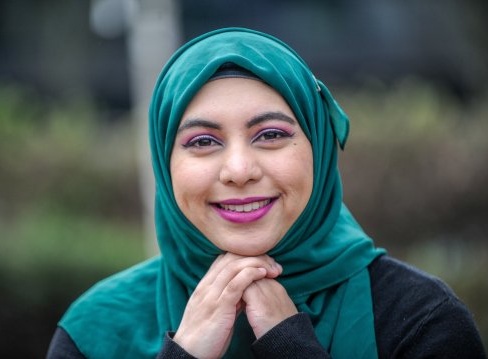Hafsa Qureshi: “It’s possible to be gay & Muslim in Britain. Times are changing.”
Amna Ahmed of the University of Birmingham writes for Birmingham Live:
Being gay may perhaps be considered to be the biggest taboo in the Muslim community.
A foreign concept, especially for the older generation.
Hafsa Qureshi, 25, first came out as bisexual at age 11 to her sister, who did not take much notice at the time.
The Birmingham Ministry of Justice worker fully opened up about her sexuality at work only recently — once she felt she had the legal protection in place to do so.
She did not do so before because she didn’t want to be “treated differently or risk her career”.
She says her bisexuality led to some friends walk away from her when she was younger and it previously affected her career where people ‘shunned her behind her back’.
Hafsa always knew her sexuality was considered sexually inappropriate in the Muslim community and says, “coming out in this community is always a risk”.
“Caught in the Middle”
Although Hafsa never faced any violence, she has received many online threats with “someone wanting to throw me off the building and do this or that”.
She says:
I feel caught in the middle between the Muslim community and the LGBT community.
I have the chance to open up the discourse and open the door a little as I may be perceived more western.
Because I wear a hijab and the way I carry myself, I seem harmless to people. People just assume I’m straight. I’m very lucky.
If I was a bisexual man, gay man, or a trans woman I would be in a lot more dangerous position physically.
Hafsa was named 2019 Bi Role Model of the Year by Stonewall for sharing her experiences as a BAME, LGBT Muslim woman.
She says, “I may be a different type of Muslim than other people. There are different ways to live and this is how I’m living. My view is that of tolerance.”
Her parents have been supportive but hope that being bi-sexual is something she will grow out of. She is hopeful they will come around:
I am very lucky with my family side of things. It is something they are willing to overlook because they know who I am.
But I don’t think they will ever fully understand it or accept it.
Many gay and Muslim people have reached out to her regarding the difficulties of coming out in the Muslim community.
Hafsa says, ‘I don’t see that many people that look like me that talk about being LGBTQ and we need more representation. You don’t have to choose between your religion and sexuality.”
“Difficult But Possible”
Hafsa emphasizes the importance of breaking stereotypes and encouraging diversity within the Muslim and the LGBTQ communities:
It is possible to be gay and Muslim in Britain. It’s just harder if you’re still living at home, living in a very Muslim community.
It can be difficult when you have people wanting to pry in your life and when you don’t have people supporting you – but it is possible.
On the Anderton Park Primary and Parkfield school protests [where some Muslims are demonstrating against educational material on different types of family relationships], she says:
Being queer and Muslim, I understand where they are coming from. I don’t agree with them, but I can understand.
Parents can choose to educate them differently at home as education takes place outside the school too.
Times are changing. This is not an Islamic state, which parents need to understand. They need to understand the Equality Act is in place and that what’s law.
Hamza emphasises that, with misinformation regarding the issue, the school and parents need to sit down for discussions.
She explains:
It would have meant a great deal to me to have had studied LGBTQ issues when I was growing up.
Seeing people like me, who were queer and Muslim, would have made my life easier.
I need to stand up and show I am a part of that community. If I can make a difference it’s worth trying.
I follow Islamic values, not traditional ones, and they’re very important to me.

